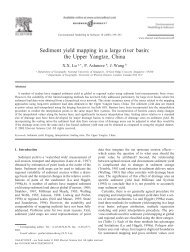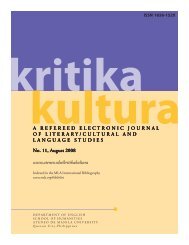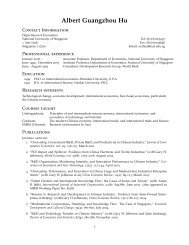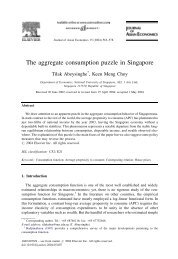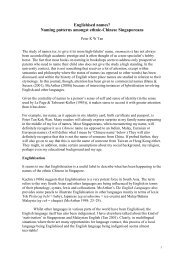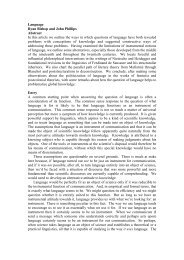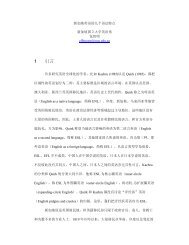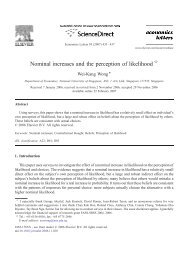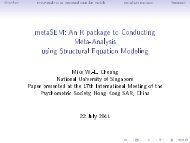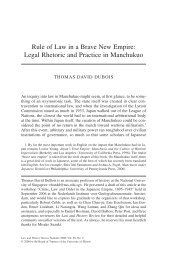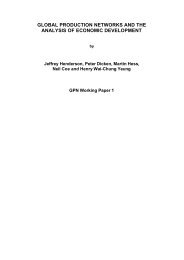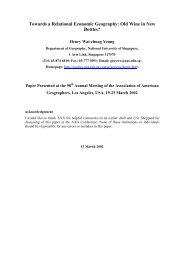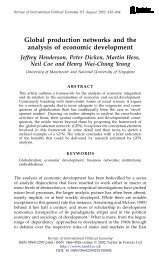Researching Hybridity in Social and Economic ... - NUS Home
Researching Hybridity in Social and Economic ... - NUS Home
Researching Hybridity in Social and Economic ... - NUS Home
You also want an ePaper? Increase the reach of your titles
YUMPU automatically turns print PDFs into web optimized ePapers that Google loves.
eaders <strong>in</strong> bus<strong>in</strong>ess <strong>and</strong> government to support their view of “crony capitalism” <strong>in</strong> East <strong>and</strong><br />
Southeast Asia.<br />
After this series of media exposures, it was clear that I needed to question my own<br />
positionality <strong>in</strong> this project on Ch<strong>in</strong>ese capitalism. This was partly because of my read<strong>in</strong>g <strong>in</strong>to<br />
poststructuralist work <strong>in</strong> human geography published at around the same time (Gibson-<br />
Graham, 1996; Thrift, 1996; Rose, 1997) <strong>and</strong> partly because of my <strong>in</strong>creas<strong>in</strong>g awareness of<br />
the potential “global” reach <strong>and</strong> impact of my research work. I came to realize how my own<br />
positionality might have shaped my research agenda <strong>and</strong> the un<strong>in</strong>tended ways through which I<br />
communicated my research f<strong>in</strong>d<strong>in</strong>gs to the wider audience (e.g. media <strong>and</strong> professional<br />
publications). 3 I thought that as an ethnic Ch<strong>in</strong>ese researcher speak<strong>in</strong>g on the perils of<br />
“Ch<strong>in</strong>ese capitalism”, my words might be construed <strong>and</strong> received rather differently (<strong>and</strong><br />
positively?) than those from such “essential outsiders” as Anglo-American scholars. I<br />
wondered whether I became part of the alleged “Western conspiracy” that, accord<strong>in</strong>g to the<br />
former Prime M<strong>in</strong>ister of Malaysia – Dr Mahathir Mohamed, brought the crisis to Asia. I<br />
began to question my own ethnic <strong>and</strong> cultural identity as an “Overseas Ch<strong>in</strong>ese” – overseas to<br />
where <strong>and</strong> what? Am I a believer <strong>in</strong> Confucianism <strong>and</strong> guanxi capitalism? Do I know <strong>and</strong><br />
practice guanxi as all ethnic Ch<strong>in</strong>ese are allegedly expected to do? What about the Italians <strong>and</strong><br />
the Jews or Anglos, doesn’t their form of economic activity rest on embedded relations even<br />
though it is not called “guanxi”? So the story <strong>and</strong> its mischief <strong>in</strong> justify<strong>in</strong>g the allegation of<br />
“crony capitalism” <strong>in</strong> Asia goes on <strong>and</strong> on <strong>in</strong> these cultural essentialist writ<strong>in</strong>gs. I began to<br />
lose faith <strong>in</strong> the culturalist perspective <strong>and</strong> went on to search for an alternative approach to<br />
study Ch<strong>in</strong>ese capitalism.<br />
Why was there a u-turn <strong>in</strong> my approach to Ch<strong>in</strong>ese capitalism? Dur<strong>in</strong>g the course of<br />
this decade-long research <strong>in</strong>to Ch<strong>in</strong>ese capitalism, what has apparently changed <strong>in</strong> me is not<br />
the subject of my <strong>in</strong>tellectual pursuit (although how I see that subject has changed), but rather<br />
8



